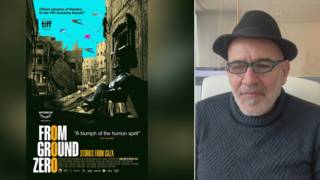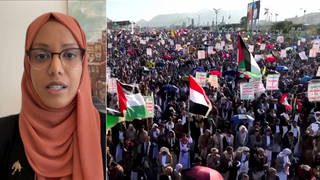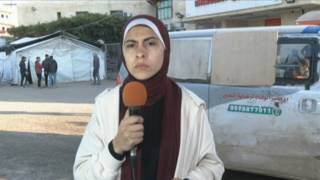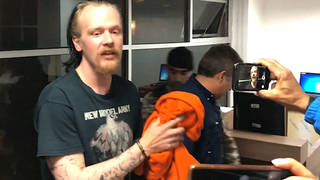
Related
Guests
- Michael Ratnerpresident emeritus of the Center for Constitutional Rights and a legal adviser to Julian Assange and WikiLeaks.
Michael Ratner, a member of WikiLeaks founder Julian Assange’s legal team, reacts to the breaking news that Ecuador has approved Assange’s request for political asylum two months after Assange took refuge in its London embassy. Britain says it still plans to extradite Assange to Sweden, where he faces questioning for alleged sexual misconduct. “The British ought to just back off, and the U.S. ought to just back off,” Ratner says. “For the British to say that they’re going to go into the embassy and get out someone who’s been granted asylum would turn the refugee convention and asylum completely on its head. … [Assange] has a right to leave that embassy, get on a plane and go to Ecuador. … That’s the law.” [includes rush transcript]
Transcript
AMY GOODMAN: We’re going to go back to Phoenix in a moment to speak with Javier Sicilia, the Mexican poet, but right now we’re going to turn directly back to Michael Ratner, president emeritus of the Center for Constitutional Rights, legal adviser to Julian Assange and WikiLeaks. The news conference, as it continues, the foreign affairs minister of Ecuador has announced that Julian Assange has been granted asylum by Ecuador. Michael Ratner, if you can talk about the significance of this? Again, Julian Assange now in the Ecuadorean embassy in London, he has been granted asylum by the country of Ecuador. What does this mean?
MICHAEL RATNER: Well, Amy, personally, first of all, I’m just—I’m really thrilled and moved. I mean, Julian Assange has been under such incredible pressure, with the threats to go in and get him, with prosecutions by the U.S., etc., that this is an incredibly courageous move by Ecuador. I mean, you have to think about it. Julian Assange, in doing what he and WikiLeaks did, stood up to the great powers of the world. And now you see Ecuador, again, standing up to the great powers. And so it’s an amazing act, really, and we should just applaud and support Ecuador for doing what was legally required here, which is to give Julian Assange asylum for his role as a journalist and a publisher of WikiLeaks.
What does it mean? Well, what it means is, first of all, is the British ought to just back off, and the U.S. ought to just back off. He has a legal right to asylum under the refugee convention. Under the U.N. declarations, there cannot be any adverse consequences for countries granting asylum. It’s considered a humanitarian act. And for the British to say that they’re going to go into the embassy and get out someone who’s been granted asylum would turn the refugee convention and asylum completely on its head. It’s unheard of. As far as I know, it’s never been done before that you’ve gone into an embassy to pull out someone granted asylum. The British are only doing this as bullies, bullies most likely for the United States.
What it also means to me is, once he’s been given asylum, which is this great moment, really—I mean, it’s just a long road still to get Julian Assange his freedom and to get the right to publish again without adverse consequences, but it’s a great moment. He also, in my view, has a right to leave that embassy, get on a plane and go to Ecuador. Will the British ever honor that, with the kinds of threats they’re making against Julian Assange? I doubt it right now. But that’s pretty—that’s the law, to me. You’re given asylum. The British can’t pick him up and then send him to a country where he will then be persecuted. And that’s what the road is. He’ll be going to Sweden, if they pick him up, and then to the United States. And it’s as if you’re sending someone back into the hands of those who are persecuting him. They can’t do it, and they should not only back off the embassy, they should ensure that he is allowed free passage out of the United Kingdom.
AMY GOODMAN: Michael Ratner, when—if someone who’s granted political asylum, as Julian Assange now has, if he got into a car to go to the airport, what is that territory considered, the actual car?
MICHAEL RATNER: You know, I think that’s an open question at this point. I think it should still be considered under the diplomatic protection of the Ecuadorean embassy. I think there’s enough law to say that. But the additional point here is the one I’m making, is once you’ve been given asylum, it’s not like you can be then picked up by a country and sent into the hands of your persecutor. Whether it’s in the car, whether it’s on the streets, wherever you are, it’s illegal to do so. And it’s illegal for the British to go into that embassy. It’s illegal for them to stop Julian Assange trying to get to Ecuador. Whether a bully of a country like the U.K., with the U.S. behind it, will listen and understand and adhere to what the law is, at this point, is not clear, considering the saber rattling and what I would call the gunboat diplomacy, if you want to even call it diplomacy, but the gunboat, that the British are essentially using against Julian Assange and Ecuador.
AMY GOODMAN: You know, we were just talking about death squads in El Salvador. Actually, in 1980, when the archbishop of—the archbishop El Salvador was killed in El Salvador, Óscar Romero, just a few months before, January 31st, 1980, in Guatemala, Rigoberta Menchú, the Nobel Peace Prize winner’s father, Vicente Menchú, had taken refuge in the Spanish embassy in Guatemala City, and he and many others were killed as the Guatemalan forces burned the Spanish embassy to the ground. Michael Ratner?
MICHAEL RATNER: Yeah, Amy, I’m familiar with that, as you are, and it’s an incredible—what it says is the kinds of governments that do what the British are doing are basically inhuman and have blood stains on them for generations for doing this. Blood stains for generations. So the—if the British are acting like that, then they’re essentially acting—is the equivalent of what the Guatemalans did to Rigoberta Menchú’s father.
AMY GOODMAN: So, right now, this is actual political asylum. He stays in the London embassy. What about Sweden’s demands that he be extradited? And what does this mean for him now? He’s been there for several months, Michael Ratner.
MICHAEL RATNER: Well, first of all, this—it’s an incredible plus for Julian Assange and WikiLeaks and for the work they doing—work they’re doing. It shows that, under political asylum, that being a truth teller, being a publisher of truth, is something that is protected by fundamental international law, and particularly the refugee convention. So on its first level, it just really gives an imprimatur of positiveness to what WikiLeaks has done over the last couple of years. Very important.
The second thing it does is it really makes Julian Assange into an internationally protected person, telling the world, “Leave your hands off him. You can’t take him into Sweden and then push him into the United States,” where the Ecuadorean government has essentially found, and found—really dramatically found—that he will not receive a fair trial in the United States, that if he—that he will be treated like Manning has been treated. He will be treated really like the Guantánamo detainees have been treated. He will be treated under a system that is—that, to the extent it ever offered a fair trial, certainly doesn’t offer it anymore. That’s an incredible indictment of the United States. But Ecuador is saying, “Julian Assange is now a protected person under international law. You cannot come into our embassy and get him.” And, in fact, he has the right to leave that embassy and go to Ecuador.
Let’s just see how this plays out, because, of course, Ecuador is a small country. It has just stood up—and we should understand that—it has just stood up to the most powerful countries in the world, the U.K. and the United States. Let’s hope that the rule of law, that the understanding of what the asylum convention meant in 1951, what asylum means today, will be adhered to by the British.
AMY GOODMAN: Michael Ratner, the significance of Baltasar Garzón becoming one of the attorneys for Julian Assange, the well-known Spanish judge and prosecutor, who was consulting with the Ecuadorean government in Quito? What about his presence as part of your team?
MICHAEL RATNER: Well, he—a part of our team would be an understatement, Amy. Baltasar Garzón really is the head of the team and the one that is really—has the ability and the political ability to move in area—in Latin America and around the world to be able to negotiate and think politically what the next steps are for Julian Assange.
But what’s really interesting about Baltasar Garzón’s case is how similar what happened to him are related to what’s happened to Julian Assange. Baltasar Garzón lost his job as a judge in Spain because he wanted to be a truth teller, open up the 140,000 disappeared in the Spanish Civil War in the '30s. And the conservatives, the Falange, the right wing in Spain, didn't want him to do that, and they then came up with excuses to knock—to get him tried and get him knocked off the bench. He’s a truth teller in the same way that Julian Assange and WikiLeaks are truth tellers. So, in a certain way, Julian Assange and Baltasar Garzón are joined at the hip. Baltasar Garzón, in my work with him on this case, he has been extraordinary, incredibly supportive, doing everything he can to ensure that Julian Assange will get the asylum—will get asylum—will get asylum and that he will be protected. And he understands the diplomacy of it.
AMY GOODMAN: Well, Michael Ratner, I want to thank you very much for being with us, president emeritus of the Center for Constitutional Rights, legal adviser to Julian Assange and WikiLeaks. I know you’re getting calls from around the world. Again, the announcement: Ecuador has granted political asylum to Julian Assange, the WikiLeaks founder. He’s in the embassy right now in London, where he can stay. Ecuador has agreed he can stay, but the British government, the authorities—through the night, the question was, would they raid the embassy? And that continues to be a question. Of course, we’ll continue to cover this situation. Final words, Michael, as we leave you to deal with the world’s media trying to find out the latest analysis on what’s taking place.
MICHAEL RATNER: Well, it’s an incredibly moving and important day for Julian Assange. I mean, we have been sitting here, waiting and waiting and hoping, hoping for this moment for Julian, for WikiLeaks, for a free press. And so, it’s incredibly important. And now our—for all of us, is supporting Ecuador’s decision to give Julian Assange asylum and to push back the British and U.S., who want to try and extract him and put him on trial as a scapegoat for their own crimes. Incredibly important day and moving day for Julian Assange, WikiLeaks and free press.
AMY GOODMAN: Michael Ratner, thanks so much for joining us. We’re going to go to break. When we come back, we go back to Phoenix, because there is a caravan going across the country to challenge the war on drugs, led by Mexican poet Javier Sicilia, who—he will be in the interview seat. Stay with us.












Media Options